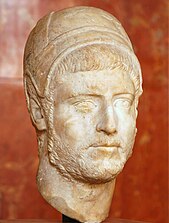
Back Фецыялы Byelorussian Фециали Bulgarian Fecial Catalan Fetialen German Feciales Spanish فتیال Persian Fétiaux French Ֆեցիալներ Armenian Feziali Italian Fetialis Latin
| Part of a series on the |
| Priesthoods of ancient Rome |
|---|
 |
| Major colleges |
| Other colleges or sodalities |
| Priests |
| Priestesses |
| Related topics |
A fetial (/ˈfiːʃəl/; Latin: fētiālis [feːt̪iˈaːlɪs], pl. fētiālēs) was a type of priest in ancient Rome. They formed a collegium devoted to Jupiter as the patron of good faith.
The duties of the fetials included advising the Senate on foreign affairs and international treaties, making formal proclamations of peace and of war, and confirming treaties. They also carried out the functions of traveling heralds or ambassadors (Pater Patratus).[1]
The first mention of the fetials by Livy occurs in the context of the war between Alba Longa and Rome, during which the Roman king Tullus Hostilius appointed Marcus Valerius as a fetial and Spurius Fusius as pater patratus, for the purpose of binding Rome and Alba Longa by a treaty.[2]
According to Livy, the ritual by which the fetials were to declare war, the ritual of rerum repetitio, was introduced to Rome by Ancus Marcius, borrowing on the traditions of the Aequi. However, he had already described the ritual actions of the fetials when recording the wars of Tullus Hostilius.[3] Thus some scholars think the mentions of the Aequi may be a misinterpretation due to a folk etymology connecting Aequi to aequus, the Latin adjective for fair (from which equitable in English). On the other hand ancient sources support the tradition that the priesthood was created under the influence of Aequian king Fertor Resius.[4]
- ^ According to one source the original meaning is unclear. The term could be read "father of the fathers", referring to the fetiales, or it could be read as a father whose own father is still living. Patratus can also be read as from the latin verb meaning to accomplish, or bring about, which could simply mean that the title meant that he was the "spokesman", the appointed father, or chosen father. In another sense of the same verb, it could mean a father who is of great accomplishment or esteemed. An Etymological Dictionary of the Latin Language, 1828, Francis Edward Jackson VALPY, pg. 324)
- ^ Livy Ab Urbe Condita I.32.
- ^ Livy, AUC I.24.
- ^ Inc. Auc. de Praenominibus I apud Valerius Maximus X: "Fertorem Resium qui ius fetiale constituit"; Inc. Auc. de Viribus Illustribus V 4 apud Aurelius Victor p. 29: "(Ancus Martius) ius fetiale...ab Aequicolis transtulit quod primus Ferter Rhesus excogitavisse"; CIL VI 1302 from the Palatine (II-I century BC); Festus s. v. Ferctius p. 81 L; Propertius IV 105-146; Plutarch Marcellus 8. 4, Romulus 16. 6.
© MMXXIII Rich X Search. We shall prevail. All rights reserved. Rich X Search